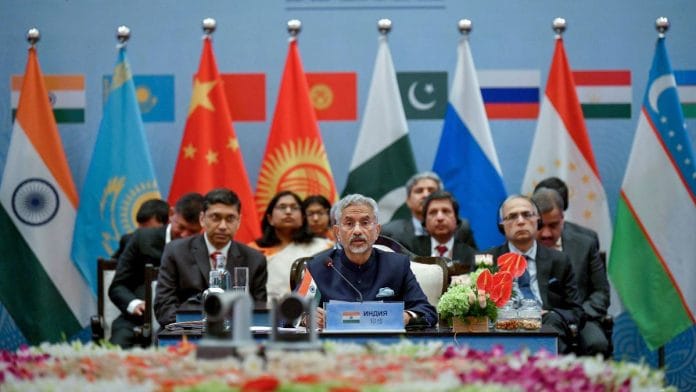New Delhi: India Saturday distanced itself from the Shanghai Cooperation Organisation’s (SCO) statement condemning Israel’s airstrikes on Iranian nuclear facilities and key personnel. The Ministry of External Affairs made it clear that “India’s own position” on the matter had been articulated by its statement on 13 June.
The SCO, a regional grouping which has both India and Iran as members had “strongly condemned” the Israeli air strikes on Tehran and its nuclear facilities earlier Saturday.
“The SCO has issued a statement on recent developments between Israel and Iran. India’s own position on the matter had been articulated by us on 13 June 2025, and remains the same. We urge that channels of dialogue and diplomacy be utilised to work towards de-escalation and it is essential that the international community undertake endeavours in that direction,” the MEA said in its statement.
The statement added: “The overall position of India as stated above was communicated to other SCO members. Keeping that in mind, India did not participate in the discussions on the above-mentioned SCO statement.”
Earlier Saturday, the SCO in its own statement “strongly condemned” Tel Aviv for its military action against Iran and labelled the strikes as a “gross violation of international law” and an “infringement” on Tehran’s “sovereignty”.
“The SCO member states firmly advocate for the resolution of the situation surrounding Iran’s nuclear program exclusively through peaceful, political, and diplomatic means. The SCO member states extend their sincere condolences to the people and government of the Islamic Republic of Iran,” added the SCO in its statement.
The organisation, which was established in 2001 by China, Russia, Kazakhstan, Tajikistan, Kyrgyzstan and Uzbekistan, expanded to include India and Pakistan as members in 2017. In 2023, Iran joined as a member and in 2024, Belarus became the tenth member of the organisation.
China is the current chair of the 10-member organisation, with the next leaders’ summit scheduled to be held in the city of Tianjin later this year. The organisation has a strong focus on cooperation in areas of security and terrorism.
The current skirmish between Israel and Iran began in the early hours of Friday, when Tel Aviv launched “Operation Rising Lion”, which struck the Natanz nuclear enrichment facility, Isfahan and Fordow in the West Asian nation.
Iran also confirmed that Israel’s strikes killed the chief of staff of its armed forces Major General Mohammad Bagheri, Major General Hossein Salami, Commander of the Islamic Revolutionary Guard Corps, Major General Gholam Ali Rashid, Commander of the Khatam al-Anbia central headquarters and two nuclear scientists–Mohammad Mahdi Tehranchi and Fereydoon Abbasi.
Tel Aviv Saturday claimed that up to nine nuclear scientists in Iran have been killed. Israel launched the operation in an effort to scuttle Tehran’s nuclear programme, with fears that Iran was very close to achieving enough enriched uranium to build a bomb.
According to Iran’s Permanent Representative to the United Nations Amir Saeid Iravani, at least 78 Iranians have been killed and over 320 have been injured. Tehran launched its own “Operation True Promise 3” late Friday evening, launching over a hundred ballistic missiles at Israel.
Explosions were seen in the air over Tel Aviv and Jerusalem. At least three Israelis were killed and dozens injured in Iran’s retaliatory strikes.
The current escalation between Tel Aviv and Tehran has been one of the most intense in the history of the two countries. Israeli Prime Minister Benjamin Netanyahu in a video statement late Friday evening said that the attacks are not against the Iranian people, but focused on the “murderous Islamic regime”.
India has urged both sides to de-escalate the situation and utilise the “existing channels” of dialogue and diplomacy to reduce tensions. External Affairs Minister S. Jaishankar spoke to both his Israeli and Iranian counterparts–Gidon Sa’ar and Syed Abbas Araghchi Friday. Israeli Prime Minister Benjamin Netanyahu also spoke with Indian Prime Minister Narendra Modi Friday.
(Edited by Viny Mishra)
Also read: Attacking Iran’s nuclear programme won’t bolster Israel’s national security







Indian will always stand with Israel. Jews will always be welcomed here. In India, Jews will always have a second home.